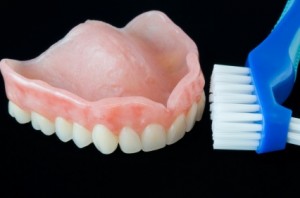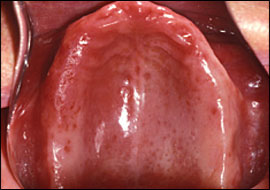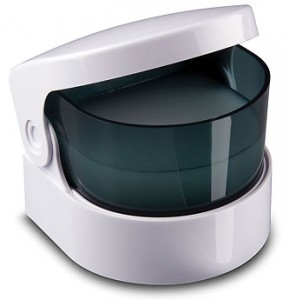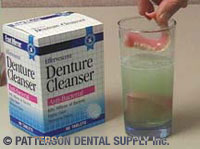
© dental-health-advice.com
Having dentures adds a new responsibility to your life. Like how your car requires maintenance throughout the years, your denture does so too. Proper care is needed to keep dentures fitting properly and comfortably, and it is your own responsibility to do so.
Why maintain your dentures?
Your dental professional should have provided you instructions for the proper care and cleaning of both the dentures and the underlying tissues in the mouth. Care of the soft tissues on which a denture rests includes removing the denture overnight or for a substantial time each day, cleaning and massaging the tissues under the denture daily, and going for regular dental examinations to check for any irritation or chronic changes in appearance of the tissues.
Cleaning and massaging of the soft tissues can be performed simultaneously by brushing with a soft-bristled toothbrush or by massaging with the thumb or forefinger wrapped in a clean cloth.
What happens when you fail to care for your denture?
Failure to remove the denture when you sleep may result in bad breath, excessive resorption of the alveolar ridge (a ridge that forms the borders of the upper and lower jaws and contains the sockets of the teeth), diseased or irritated mouth tissues, or the development of epulis fissuratum.
Consistent, effective cleaning of dentures not only serves to enhance the sense of cleanliness of the mouth, but also serves to prevent bad breath, denture stomatitis, and other tissue irritations. Irritation of the mouth soft tissues can lead to difficulties in eating, which can have a negative nutritional impact on a frail, elderly individual. Frequently, denture wearers are only aware of the aesthetic benefits from maintaining cleanliness, which is a wrong mentality to keep.
The surface of a denture has many microscopic pores that attract dental deposits like plaque, tartar and stains, as well as bacterial and fungal organisms. Commonly practiced cleaning methods include immersion, brushing, or a combination of both.
How to clean dentures
Removal of deposits can be done by brushing in conjunction with an abrasive agent or brushing a denture before and after it has soaked in an immersion cleaner. Incorrect use of an abrasive agent (poor technique and/or too much pressure) can damage the denture. A brush with medium or soft end-rounded bristles, if used properly, should not abrade denture materials. A denture brush provides access to all surfaces of a denture.
Non-abrasive agents such as soap or baking soda, or a commercial dentifrice may be safely used in conjunction with a brush. Other agents may be harmful to denture materials.
Ultrasonic or sonic devices are available for home denture cleaning. They utilize a cleaning solution in conjunction with agitation produced by ultrasonic (inaudible, high frequency) or sonic (audible) sound waves to remove debris and stains. Individuals with limited dexterity or for the personal-care staff at long-term care facilities may find the use of these devices particularly helpful. Whichever method is used, the denture should be thoroughly rinsed under running, lukewarm water before inserting into the mouth in order to remove any substances that could irritate soft tissues.
Using immersion denture cleaners
There is an advantage in immersing the denture in a cleaning solution as it can reach all parts of a denture compared to brushing, in which areas of the denture may be missed. Therefore a combination of both brushing and immersion may result in a more thoroughly cleaned denture. When selecting an immersion cleaner, the type of denture material must be considered. Alcohol or essential oils found in commercial mouthwashes are not compatible with the denture acrylic material, as prolonged contact with these substances may result in the denture becoming dry or lose its color.
Homemade solutions include using hypochlorite solutions diluted 1:10 with tap water to act as antifungal and antibacterial agents and adding a teaspoon of calcium-chelating dishwasher detergent to help control tartar or stains. Care must be taken to not immerse appliances with metallic components in hypochlorite solutions since the metallic surface may corrode. It is important that you thoroughly rinse the bleach off before placement on the oral tissues. Acetic acid (vinegar) can be used for immersion as it will kill some organisms and is less caustic to soft tissues if not thoroughly rinsed.
Commercial alkaline peroxide powders and denture tablets are also available. These typically contain an alkaline for oxidizing, perborate or carbonate for effervescing, and a chelating agent (EDTA). When dissolved in water, these agents decompose and release oxygen bubbles, which mechanically loosen plaque debris on the denture surface. The alkaline substances and detergent enhance the mechanical effect of the bubbles.


